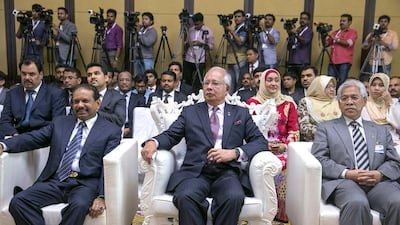Lulu plans to build 10 hypermarkets across Malaysia as the Abu Dhabi-based retailer taps into flourishing investment ties between the UAE and the Asian nation.
Lulu Hypermarkets expects initial investments to reach US$200 million for the first five of the Malaysian hypermarkets, slated to start opening in 2016. In the longer term, the retailer aims for a 20 per cent market share in the country.
Lulu is opening the hypermarkets with the help of Malaysia’s government-run federal land development authority (Felda), Yusuffali MA, the managing director of Lulu Group International, said at a signing ceremony yesterday in Abu Dhabi. It was attended by the Malaysian prime minister, Najib Razak, who is on an official visit to the UAE this week.
“Today the whole world knows Malaysia, economic stability, investor friendly policies, developed infrastructure,” said Mr Yusuffali. “With the cooperation of Felda, we will initially be opening five world-class hypermarkets with international standards, salaries and fully halal-compliant. After completion of these projects we will be able to provide direct employment to 2,500 Malaysian citizens and indirect employment to about 5,000 people.”
Each of the five hypermarkets will require an initial investment of US$30 million to $40m, and Felda will provide buildings at each location in Kota Bharu, Bukit Katil, Ipoh, Nilai and Shah Alam. Other locations are being surveyed, Lula and Felda said in a joint statement. Details of the financing were not disclosed.
Ties between Malaysia and the UAE have been warming in recent years, especially after Dubai announced it was keen to create an Islamic finance hub similar to Malaysia’s sukuk market, the largest in the world.
Abu Dhabi’ s Aabar Investments, in partnership with a Malaysian company, last year helped to raise $3 billion to invest jointly in projects such as energy and property. That followed a high-profile visit to Malaysia in the same year by Sheikh Mohammed bin Zayed, Crown Prince of Abu Dhabi and Deputy Supreme Commander of the Armed Forces, during which Abu Dhabi sealed a $7bn investment in an oil storage facility in the Asian country.
Mr Yusuffali also said Lulu was planning to start a logistics centre to procure Malaysian products for the hypermarkets and for exporting elsewhere.
With a predominantly Muslim population of about 30 million, Malaysia was a good fit for Lulu’s Sharia-compliant grocery concept, he said. The group is also planning to open two hypermarkets in Indonesia next year and is expanding in India, where it has operations in the state of Kerala.
India has previously blocked foreign investment by multinational retailers, in a bid to protect small grocery shops that employ millions. Along with other bureaucratic hurdles, global grocery giants have been cautious in the past about entering India. India’s prime minister elect, Narendra Modi, has signalled more flexibility to foreign investment in the sector.
“We already started one [Indian hypermarket] and are on the way,” said Mr Yusuffali. “FDI is not an issue for me. We will expand in India.”
mkassem@thenational.ae
Follow us on Twitter @Ind_Insights

